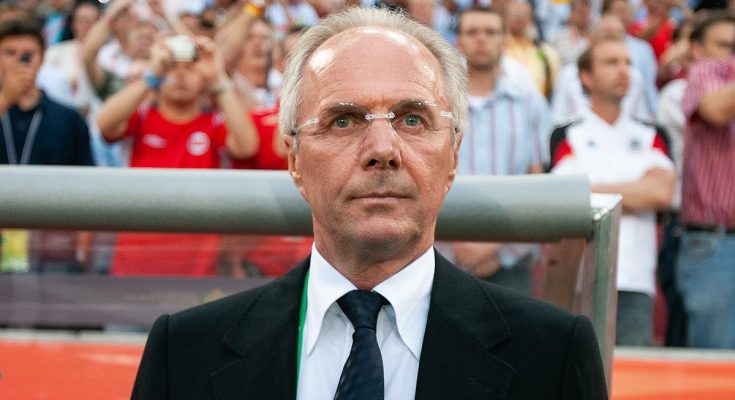Sven-Goran Eriksson has hit out at one former colleague at the FA over his affairs scandal in a new book that is set to be published after the legendary former England managers death.
Eriksson, who tragically passed away last month following a battle with cancer, led the Three Lions from 2001 to 2006.
It was part of a glittering managerial career for the Swede, but his time with England was marred by scandalous headlines surrounding his love life.
Eriksson was in a relationship with Nancy DellOlio, but had an affair with Ulrika Jonsson and Faria Alam during that time, before he split with DellOlio in 2007.
His romance with Alam was more high-profile, given she was the then-secretary of the FA, with significant efforts made to keep it under wraps before it eventually creeped into the public domain in August 2004.

Sven-Goran Eriksson has hit out at one former colleague at the FA over his affairs scandal in a new book that is set to be published after the legendary former England managers death

Eriksson was in a relationship with Nancy DellOlio during his time in charge of England, but his tenure was marred by several scandalous allegations surrounding his love life

Erikssons most high-profile affair was with Faria Alam, who was the FA secretary at the time

Eriksson also had a romance with TV presenter Ulrika Jonsson when he was England boss
In reaction to this, according to Swedish outlet Expressen, Eriksson claims he was advised to do an interview with the former tabloid paper, News of the World, to discuss his relationship with Alam but told not to mention the name of FA chief executive Mark Palios.
Palios had also had an affair with Alam previously – something that was not yet known publicly.
And Eriksson, in A Wonderful Journey, which is yet to be released, opened up on the anger he felt towards the FA for effectively hanging him out to dry.
I would be sacrificed to save Mark Palios skin, Eriksson said, as per Expressen. I told (then-FA director of communications) Colin Gibson that he was a piece of s***, and that I had always thought so.
He knew that, we never got along well. In the end both Gibson and Palios had to leave their jobs, Gibson for trying to cover up Mark Palios role in this affair.
Palios was forced to resign after news ultimately broke of his relationship with Alam in the media, while it was later reported by the News of the World that Gibson had offered to reveal full details of the Eriksson affair to the tabloid in return for keeping quiet about Palios relationship with Alam.
Gibson has been approached for comment and it is unclear whether he agrees with Erikssons recounting of the series of events.
Yet, despite the saga surrounding everything, Eriksson admitted he felt he had done nothing wrong, although he did open up on the pain of the news filtering into the public domain.
The paparazzi photographers never got any pictures of me and Faria Alam, he added.
I was very careful, we never met at her house or mine. But the press started digging, friends of her contacted. Someone knew, someone gossiped. I suspected that it was Faria herself and I felt both betrayed and cursed.
I have been asked many times if I regret meeting Faria Alam and Ulrika Jonsson. Well, if I had known what would come of it, then I might have called it all off.
But morally, I dont understand. Shouldnt I, just because I was the national team manager, get to meet and have a relationship with whoever I wanted?

Mark Palios, who was the FAs chief executive at the time, had also had a relationship with Alam
Alongside his time in charge of England – where he was the first ever foreign coach to be in charge of the Three Lions – Eriksson enjoyed a hugely successful managerial career, coaching the likes of Benfica, Lazio, Man City and Roma.
Yet, despite leading what was dubbed a Golden Generation, he was unable to guide the Three Lions to glory.
At the 2002 and 2006 World Cups, along with Euro 2004, England were knocked out at the quarter-final stage as Eriksson struggled to cultivate a successful team, amid a myriad of club divides within the squad.
Nevertheless, Eriksson won 40 of his 67 games in charge and enjoyed subsequent international stints with Mexico, Ivory Coast and the Philippines.
Despite his lack of success with the Three Lions, he remained hugely popular in the UK – where he later coached Man City and Leicester – and received a significant outpouring of love and support after his terminal cancer diagnosis.



